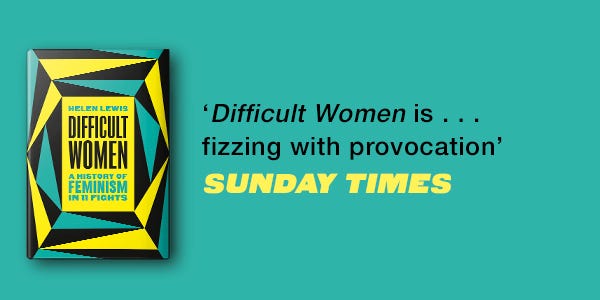Happy Friday!
This week, I wrote about the Mary Wollstonecraft statue, before embarking on a week of “holiday”. Ha ha bloody ha. I’ve spent 200 hours in the same 10 square meters and I still haven’t written De Profundis.
I also discovered you can subscribe to my Atlantic articles as an RSS feed.
Helen
Why Even The Most Sensible People You Know Are Bending Covid Rules (Medium)
This need to be polite — and not cause a ruckus — causes us to stay put in risky situations rather than extricating ourselves, even when we want to. In early October, Eric, a graphic designer who lives in New York City, attended his cousin’s wedding only after the bride and groom reassured the guests that the wedding would involve strict safety protocols. (Eric asked us not to print his last name to protect his family members’ identities.) Yet when he and his parents arrived at the rehearsal dinner, they — along with 80 other guests — were escorted into an indoor dining room with no windows, and they were the only ones wearing masks. Although he felt deeply uncomfortable, Eric didn’t want to leave and upset the bride and groom. “I felt like it was super risky. But I also wouldn’t miss my cousin’s wedding,” he says. “I’m like, I’m not going to not be here. But I also don’t feel like this is a very intelligent decision.”
Social conformity is a savagely effective force. The main takeaway from this piece is: speak up as soon as people start breaking the rules, or you’ll never have the courage to speak up.
Loneliness and Me (Financial Times)
For me, the care of others can feel like starlight: visible, yet too far away for warmth. . .
Though I am friendly with many — I talk to neighbours, to fellow parishioners at church, to all kinds of strangers — it’s hard to say at this point that there’s a single person who knows the minutiae of my life. Novelist Ann Patchett wrote in 2003 that real intimacy was “not the person who calls to say, ‘I’m having an affair’; it’s the friend who calls to say, ‘Why do I have four jars of pickles in my refrigerator?’”
There has been a lot written on lockdown loneliness, but nothing as good as this piece.
Absolutely furious I watched 10 hours of The Crown instead of this:


Decisions, Decisions
Bluestocking 164 prompted a big postbag on decision-making, so (with permission) I’m sharing some highlights.
Theo Zenou, a PhD student in political history who studies American presidents, writes:
Decisions are as much about intellect as about instinct. We tend to over-think everything — yet decisions can also come down to ‘gut feeling.’ However, to trust one's instincts demands supreme self-confidence which politicians, often cerebral people, struggle to develop. FDR is a good example of someone who did trust his instinct to a ridiculous degree.
Decisions have to be taken alone. My research is on JFK: the way he made decisions is revelatory. He heard first from all his advisors—giving consideration to each and everyone—then told them to get out of the Oval Office. In silence and alone, he made his decision and called his advisors back to let them know what it was. By then, his mind was made up; he didn't want his advisors to say anything. He just wanted them to know where the gauntlet had fallen. There’s an important lesson here: In politics, as in business, decisions are better when they are informed by a trusted group… but ultimately made by one person. The problem with making a decision with advisors in the room is the decision is not really that of the ‘decider’ but that of the ‘group’. The decision is driven by consensus (the 'mood' of the room) with the leader trying to triangulate, strike a sheepish compromise and keep everybody ‘happy’… Those kind of ‘indecisive decisions’ usually end up satisfying no one—but upsetting no one either. Yet, as you point out, decisions are necessarily going to upset some people, that’s part of leadership.
Advisors need to have no agenda of their own. In our personal life, we wouldn’t take advice from people who don’t genuinely care about us or are trying to use us to achieve their own end. Yet, in matters of state, this happens all the time. At the end of his presidency, JFK made a lot of decisions that went directly against Pentagon/State Department policy. (For instance: He signed a nuclear treaty with the Soviet Union and announced a joint moon mission with them too.) JFK kept KEY members of his administration completely in the dark about these decisions; they only learned of them when Kennedy announced them to the public! Here, in a sense, JFK was protecting his decision-making process and purposefully keeping out people he knew he could not trust, had their own agenda and would try to dissuade him or, worse, sabotage his plans.
Another reader, who works in NHS mental health provision, adds that I should consider the concept of blame:
“Managers and supervisors often have to make difficult calls around really high stakes issues, like suicide risk or safeguarding issues. I've noticed that some seem to be much more at ease with this than others, who have sometimes appeared to pass the question back to me, maybe wanting to share the responsibility and the potential blame should something goes wrong . . . On a more psychological note, I have also noticed that many people with very strong internal critics have problems making decisions because they know that if it goes wrong they will blame themselves later, and so they are trying to avoid a process of internal recriminations.”
Another reader said that Boris Johnson’s indecisiveness reminded her of a former boss:
It was exhausting – we never knew when we would be reverse ferreting on something and I never learnt not to be annoyed about that, even when I had no particular preference for which way we should do something. Second, (possibly like Johnson) he was someone who was highly educated but not very intelligent. People below him despised the flip-flopping and revealed mediocrity while people above him seemed to take him at his own valuation. Is there a veneer of public school self-confidence on top of a (secret) self-acknowledgement that other people know more, that leads to this kind of behaviour?
One more reply, on the cognitive drain of parenting:
When you’re deep in small people parenting, you have to make hundreds of decisions a day. Can I have as biscuit? She took my crayon! It’s not fair! Can we have iPads? . . . Structure is really important because it’s hard — it takes huge amounts of mental physical and emotional energy . . . [and] that energy is not available for high level, Big Job paid work without really over stretching my capacities. Sigh.
I mean, there’s a reason they call it the nanny state and not the butler state. Butlers might bring you another drink and pick up your coat, but it’s Nanny who knows what’s good for you and makes you do it!
Quick Links
“The vast majority of the people who work at any given publication are not professional political journalists, and generally the further you get from the ~~political journalism~~ section of a media organization the more left-wing things get.” (Matt Yglesias, Slow Boring)
“Thanks, pal. I don’t imagine France collapsing anytime soon either. Thanks for coming. Don’t let the door hit you on the way out. For your next book, tell us about those riots in France, the cars burning in the suburbs of Paris. What was that all about? Were fat people involved?” Found this brutality of a book review — on Bernard-Henri Levy’s travels through America — from 2006, and mightily enjoyed it. (New York Times)
How academia resembles a drug gang. (LSE blogs)
All writing advice books should include this important information.
“At great risk to himself, he smuggles notes about the genocide out of the country, only to be met — once again — with total lack of interest. Guardian readers don’t look at the newspapers to hear bad things about the Soviet Union! Guardian readers want to hear about how the Glorious Future is already on its way!” Slate Star Codex reviews Malcolm Muggeridge’s autobiography (via Tom Chivers).
“It is a strange, melancholy feeling to turn sixty-five and realize that what you have spent a good portion of your life working for and toward was not only meritless but destructive.” This new book by a Republican political consultant sounds bleak, and Dorian Lynskey’s piece is fascinating on the wider phenomenon of “heretic confessions” (Unherd).
Everyone’s favourite neoliberal, Sam Bowman, has written a comprehensive list of the things in his life which have given him most consumer surplus. This will double as your Christmas list.
Correction: In the last newsletter, I praised Rob Hutton’s piece for Politico. In fact, it appeared at PoliticsHome. To atone for my sins, here is another PoliticsHome piece: Sam Freedman, who worked with Dominic Cummings as a SpAd at the department for education, on the problem with the DomCum plan to remake Whitehall, even if you don’t get sacked first for being mean about the boss’s girlfriend.
“There’s limited value in having project management whizzes in your control centre when Capita actually does your project management,” writes Freedman. Plus: “No amount of Fields medallists sitting in No. 10 NASA control centre can compensate for a junior minister who cares more about a good headline in the Mail than a decent policy.”
Dunno who’s commissioning all this gold, but it certainly can’t be that loser Alan White who used to write powerful blogs for me at the New Statesman. Oh, wait, sorry, I’m hearing in my earpiece that it is Alan White. Carry on.
This Might Be The Perfect Joke
See you next week . . .







